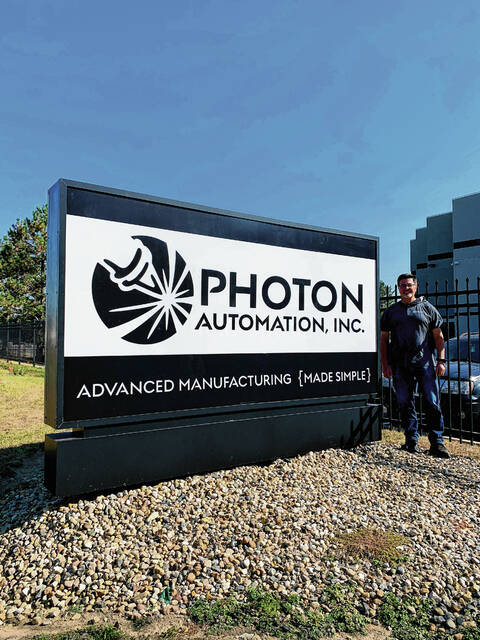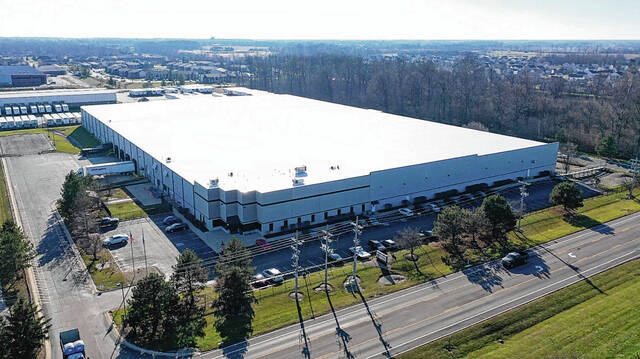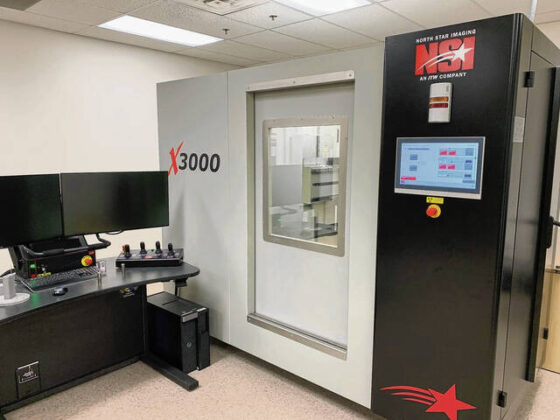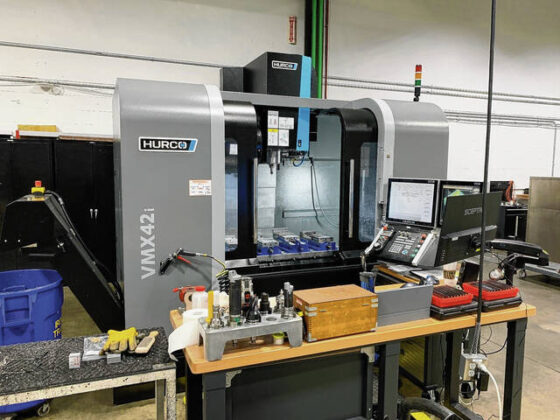GREENFIELD — When companies enlist the services of Photon Automation, Inc., they typically know what they want to accomplish, but the complexity of the objective and technological challenges stand in the way.
Oftentimes those objectives require a laser that can zero in on a precise location, or welding together two different kinds of metals with different characteristics. Robots may be needed to complete intricate tasks, or systems using a network of high-resolution cameras to ensure everything is carried out to the most finite detail.
Photon Automation has been helping companies achieve goals with those tools for over 20 years now in a variety of industries, most notably electric vehicles.
“We don’t always just focus on laser manufacturing, but it’s really our core, our background, our expertise,” said Bill Fletcher, sales and marketing manager for Photon Automation.
Those lasers are part of very precise applications, like making tiny holes in exotic metals, and taking material as thin as aluminum foil and welding it to another surface.
The company has developed a process for laser-welding small strips of aluminum that act as current collectors onto batteries used in electric vehicles.
Accuracy is vital for the method, as the surface the aluminum strip is being welded to is about the size of the top of a AA battery. If the laser misses, the battery catches on fire.
Speed is also important, considering it takes close to 1,000 batteries to make a pack, and about 10 packs to power an electric vehicle.
The technique is applicable to batteries for other devices as well, Fletcher said, including drones, medical equipment and power tools.
In 2015, Photon Automation developed a patent for pulse spread technology to laser-weld different kinds of metals together, something often required for electrical or strength purposes. Different metals have varying characteristics, which can make them difficult to weld. But Photon Automation’s pulse spread technology allows laser power to be adjusted at high speeds. While laser welding existed before Photon Automation’s patent, the company’s technique makes it faster and more reliable.
“Just learning that process has helped us to get into this kind of business,” Fletcher said. “We don’t always have to use that patented technology, but that helps us really learn about characteristics of laser welding materials and different applications to where we can do it in a wide variety of other projects.”
Photon Automation helps companies tackle complicated assembly projects as well.
“We like to look at everything,” Fletcher said. “We never know where the market’s going to go.”
It doesn’t go company to company asking what kinds of automation processes they need, however.
“But when they find out we can help them develop a process on something they don’t have yet — that’s our niche,” Fletcher said.
Photon Automation’s automation projects go beyond what’s often thought of when it comes to the practice, like automobile assembly lines and miles of conveyors snaking through warehouses of e-commerce giants.
“It’s a more defined process, and you got several people out in the industry that can do a very good job at that,” Fletcher said. “We’re not competitive in that. … But when you come to us with a new design that hasn’t really been totally worked out, and you need to automate it or get it to a point where it can be an automated process, that’s when we come into play.”
The company can integrate robotics into automation projects for positioning parts, and vision systems using high-resolution cameras to ensure precision-heavy tasks like laser welding are accomplished properly.
Photon Automation designed a conveyance system for an electric vehicle battery line that involves laser-welding four layers of metals in 38 seconds before moving onto the next task.
“We work on very high-precision applications,” Fletcher said. “We’ve done other automation stuff without that, but we always come back to these kinds of things.”
The company developed another electric vehicle battery line involving robots pulling individual smaller batteries out of boxes and placing them in cell trays before putting walls on each side of the trays. The process also includes glue dispensing, curing using ultraviolet light, laser-welding and testing. All of the different components communicate with one another to kick out a battery every 54 seconds.
“The mechanics behind it is mind-blowing,” Fletcher said.
The rise of lithium ion batteries is where Photon Automation is finding much of its success.
“It’s power tools, ATVs, medical device batteries, all that stuff, instead of using the traditional acid-cell batteries that don’t keep a charge,” Fletcher said.
The company has an applications lab where it helps customers develop the processes they’re after, and where about 10 projects are currently underway. After learning what a company wants to make, Photon Automation heads to the lab to try to answer: Can it be done?
“Before you do a million, can you do one?” Fletcher said. “This is where the one begins.”
A project may not always work out, but the company gains valuable knowledge for others in the future.
“And we can put them together and hit a home run on the next one,” Fletcher said.
Coming up with applications that have never been done before and hitting companies’ deadlines so they can kick off their endeavors can be daunting, he continued.
“It’s stressful and exciting and cutting edge, but it’s what we like to do,” Fletcher said. “We like those kinds of challenges.”
The company builds its own electrical panels and controls as well, and does its own machining for parts.
Photon Automation also has an inspection lab with laser and robotics equipment, 3-D printers and a CT scanner for taking a deeper look into welds.
The company currently has about 65 employees, about 25 of whom work in the disciplines of mechanical, electrical and control engineering.
It began in 2000 with three owners. Staff worked out of their homes until 2016, when the company moved into the local American Legion post’s former space at 275 S. Center St. In 2019, the company moved into the much larger 221,000-square-foot building that formerly housed a Stanley Black & Decker operation.
Lately, Photon Automation has been getting into contract manufacturing, taking on jobs like customizing machines to laser-weld a custom order of batteries.
“Even though we’ve been in this business for a long time, we’re always seeing more avenues to get into different things,” Fletcher said.








